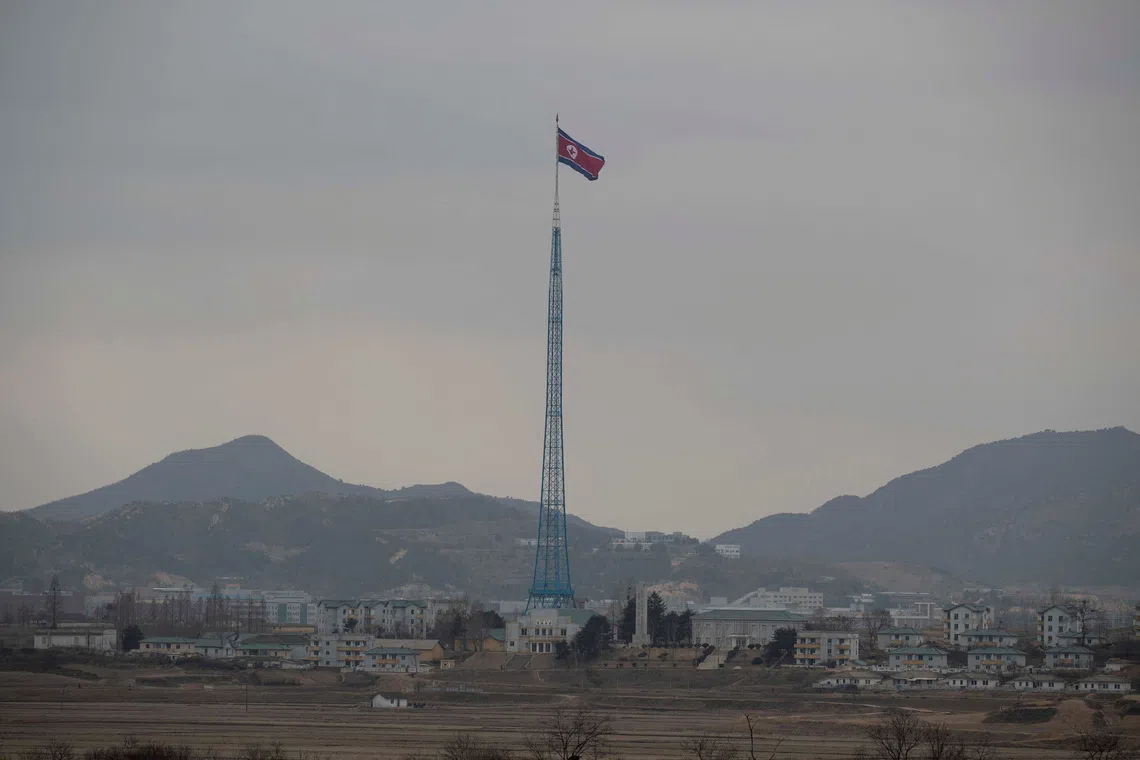North Korea fires ballistic missiles as Trump prepares for Asia trip
Sign up now: Get ST's newsletters delivered to your inbox

North Korea last launched ballistic missiles on May 8 when it fired multiple short-range missiles from its east coast.
PHOTO: REUTERS
Follow topic:
SEOUL - North Korea fired what appeared to be multiple short-range ballistic missiles on Oct 22, said South Korea’s military, a week before a key Asia-Pacific leaders’ meeting in South Korea.
It was the first launch of ballistic missiles since May by Pyongyang, which has defied a UN Security Council ban on the weapons.
It was also the first such launch since Mr Lee Jae Myung was elected president in South Korea, with a platform of engagement with North Korea.
Mr Lee and US President Donald Trump are expected to meet in South Korea next week at a summit meeting of the Asia-Pacific Economic Cooperation forum.
Mr Trump is also expected to meet Chinese President Xi Jinping.
South Korea detected several projectiles believed to be short-range ballistic missiles fired from an area near North Korea’s capital Pyongyang in a north-easterly direction early on Oct 22, said South Korea’s Joint Chiefs of Staff in a statement.
Trump to visit South Korea
Mr Lee and Mr Trump have discussed the idea of meeting North Korean leader Kim Jong Un when the US President visits the South, but Pyongyang has not publicly responded to the idea.
US officials have considered, but never confirmed, a trip to the demilitarised zone separating the two Koreas, according to a person familiar with the discussions.
South Korea has suspended tours of the Joint Security Area at the inter-Korea border village of Panmunjom until early November, but has not confirmed any plans for a meeting with Mr Kim.
Mr Trump and Mr Kim held three summits during Mr Trump’s first term from 2017 to 2021, and exchanged a number of letters that the US President called “beautiful”, before the unprecedented diplomatic effort broke down over US demands that Mr Kim give up his nuclear weapons.
In September, Mr Kim expressed “fond memories” of Mr Trump, saying there was no reason to avoid talks with the US if Washington stopped insisting that his country give up nuclear weapons, but he would never abandon the nuclear arsenal to end sanctions.
“It is not at all inconceivable that Donald Trump could, here in Washington, DC, say, ‘Denuclearisation, that’s our goal, that’s our policy’ and then go up to Panmunjom and say, ‘Oh, you know, Kim Jong Un is a nuclear power,’” said Dr Victor Cha from the Centre for Strategic and International Studies.
“Even if it’s a short meeting, in the broader scheme of things, with all that the United States has to deal with these days, it wouldn’t necessarily be a bad thing.”
Dr Andrew Yeo, a senior fellow at the Brookings Institution, said that while a Trump-Kim meeting was not impossible, the US President’s known schedule and timing might make it unlikely.
“Trump’s only there for one night, two days, and because of the Xi-Trump meeting, that’s probably taking up all the bandwidth or resources of the US government,” he said.
Multiple missiles launched
Nuclear-armed North Korea has steadily upgraded its missile capabilities over the past decade, defying multiple UN sanctions.
It has test-launched long-range ballistic missiles with potential ranges to strike the US mainland if fired at a trajectory calibrated for that purpose.
South Korea’s military said it had detected movements ahead of the launch, then tracked the projectiles after they were fired and flew about 350km. The missiles appeared to have fallen inland, a military official separately said.
Japan’s new Prime Minister Sanae Takaichi said there was no impact on Japan’s security from the missile launch, and that Tokyo was sharing real-time information with the US.
North Korea last launched ballistic missiles on May 8 when it fired multiple short-range missiles from its east coast.
North Korea showcased its latest intercontinental ballistic missile earlier in October at a parade attended by the Chinese Premier. REUTERS

